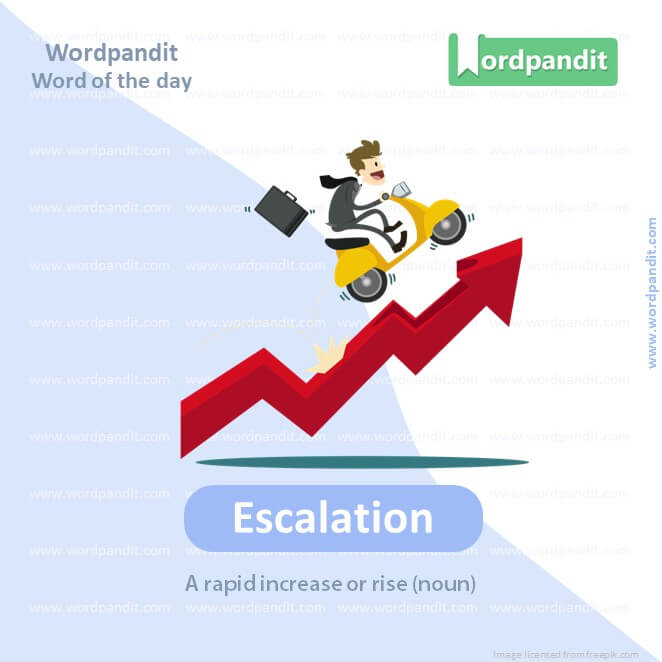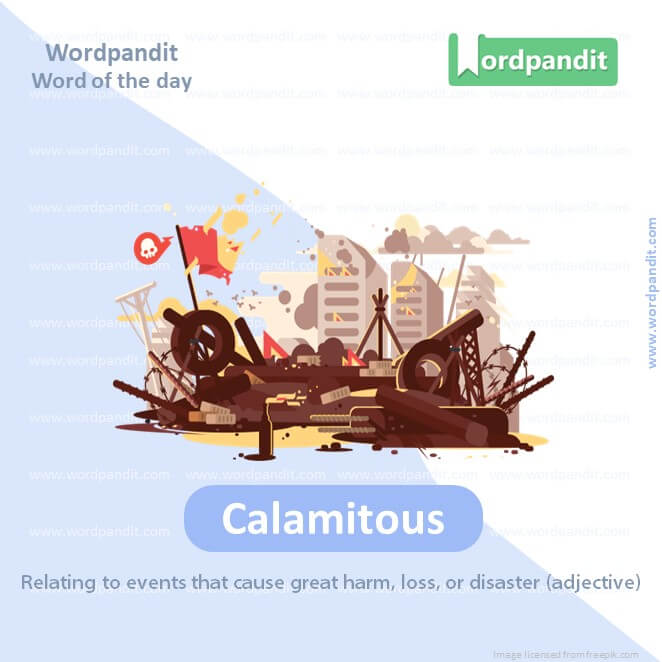Daily Vocabulary Words: List of Daily Used Words
Hi there. Welcome to this special section @ Wordpandit.
Our endeavour here is straightforward: highlighting important daily vocabulary words, you would encounter in The Hindu. This is your repository of commonly used words; essentially, we are posting a list of daily used words. Hence, this has significant practical application as it teaches you words that are commonly used in a leading publication such as The Hindu.
Visit the website daily to learn words from The Hindu.
WORD-1: Protracted
CONTEXT: A protracted or general war between China and the U.S., spreading beyond Taiwan, could spill over in multiple directions.
SOURCE: The Hindu
EXPLANATORY PARAGRAPH: Protracted is like something that lasts for a long time, stretching on and on without a quick resolution, similar to a long movie that doesn’t seem to end.
MEANING: Extended or prolonged in time
(adjective).
PRONUNCIATION: pruh-TRAK-tid
SYNONYMS: prolonged, extended, drawn-out, lengthy, enduring
USAGE EXAMPLE:
1. The negotiations became protracted due to disagreements.
2. His illness led to a protracted period of recovery.
3. The protracted legal battle drained their resources.
4. The protracted winter delayed the start of spring activities.

WORD-2: Escalation
CONTEXT: And it could raise the risk of unthinkable nuclear escalation.
SOURCE: The Hindu
EXPLANATORY PARAGRAPH: Escalation is like a situation where things keep getting worse or more intense, similar to a small problem growing into a bigger one.
MEANING: A rapid increase or rise (noun).
PRONUNCIATION: es-kuh-LAY-shun
SYNONYMS: increase, intensification, amplification, rise, escalation
USAGE EXAMPLE:
1. The escalation of the argument led to shouting.
2. The escalation of violence in the region raised concerns.
3. Efforts were made to prevent the escalation of the crisis.
4. The escalation of prices affected consumer confidence.

WORD-3: Calamitous
CONTEXT: While a conflict itself would be calamitous, its outcomes could further worsen India’s long-term international position, depending on which side prevails.
SOURCE: The Hindu
EXPLANATORY PARAGRAPH: Calamitous is like something that causes great harm or disaster, similar to a severe storm wreaking havoc on a town.
MEANING: Relating to events that cause great harm, loss, or disaster (adjective)
PRONUNCIATION: kuh-LAM-i-tuhs
SYNONYMS: disastrous, catastrophic, devastating, ruinous, tragic
USAGE EXAMPLE:
1. The earthquake had calamitous effects on the region.
2. The calamitous decision resulted in financial ruin.
3. Her actions had a calamitous impact on the project.
4. The war had calamitous consequences for civilians.
WORD-4: Pre-eminent
CONTEXT: If China, through the crucible of battle, thereby displaces the U.S. as the region’s pre-eminent military power, it would undermine the region’s entire security architecture.
SOURCE: The Hindu
EXPLANATORY PARAGRAPH: Pre-eminent is like being at the very top, the best or most important, similar to being the star player on a winning team.
MEANING: Superior or outstanding in quality or importance (adjective).
PRONUNCIATION: pree-EM-uh-nuhnt
SYNONYMS: outstanding, superior, excellent, top, foremost
USAGE EXAMPLE:
1. He was regarded as the pre-eminent scientist in his field.
2. The company is known for its pre-eminent position in the industry.
3. Her pre-eminent talent as a musician earned her international acclaim.
4. The pre-eminent goal was to improve customer satisfaction.

WORD-5: Emboldened
CONTEXT: It may even feel emboldened to press its claims on Arunachal Pradesh. India is not an American ally, but it does depend on the U.S. for its military modernisation and a broadly benign strategic environment.
SOURCE: The Hindu
EXPLANATORY PARAGRAPH: Emboldened is like feeling more confident or courageous, similar to gaining courage after receiving encouragement or support.
MEANING: Made more confident or courageous (adjective)
PRONUNCIATION: em-BOL-duhnd
SYNONYMS: encouraged, fortified, empowered, emboldened, inspired
USAGE EXAMPLE:
1. His success emboldened him to take on new challenges.
2. The support from her friends emboldened her to speak up.
3. The emboldened protesters demanded immediate action.
4. The positive feedback emboldened the team to aim higher.
WORD-6: Non-belligerent
CONTEXT: The military balance across the Taiwan Strait will therefore be the most critical deterrent, but non-belligerent states like India can buttress deterrence by convincing
Beijing that it has not adequately set the conditions.
SOURCE: The Hindu
EXPLANATORY PARAGRAPH: Non-belligerent is like being peaceful or not inclined to fight, similar to wanting to resolve conflicts without resorting to violence.
MEANING: Not inclined to fight or engage in war (adjective).
PRONUNCIATION: non-buh-LIJ-er-uhnt
SYNONYMS: peaceful, pacifist, non-combatant, non-aggressive, non-violent
USAGE EXAMPLE:
1. The country maintained a non-belligerent stance in the conflict.
2. She advocated for non-belligerent solutions to international disputes.
3. The non-belligerent approach reduced tensions in the region.
4. Non-belligerent negotiations led to a peaceful resolution.
WORD-7: Deterring
CONTEXT: They offer a wider agenda for Indian international leadership, especially among countries of the Global South, which otherwise would be passive or at best uncoordinated in deterring Chinese aggression more broadly.
SOURCE: The Hindu
EXPLANATORY PARAGRAPH: Deterring is like preventing something from happening, similar to dissuading someone from doing something they were planning.
MEANING: Preventing or discouraging from taking action (verb).
PRONUNCIATION: dih-TER-ing
SYNONYMS: discouraging, dissuading, hindering,
preventing, thwarting
USAGE EXAMPLE:
1. The security measures were aimed at deterring theft.
2. Her warning about the risks deterred them from proceeding.
3. Deterring illegal activities requires effective enforcement.
4. The deterring effect of the law reduced crime rates.

WORD-8: Arduous
CONTEXT: The Telangana government is facing an arduous task in fulfilling the six guarantees that the Congress promised before being voted to power, thanks to the slow pace of growth in revenue receipts.
SOURCE: The Hindu
EXPLANATORY PARAGRAPH: Arduous is like something that is very difficult or demanding, similar to climbing a steep mountain.
MEANING: Requiring a lot of effort and hard work (adjective)
PRONUNCIATION: AHR-joo-uhs
SYNONYMS: difficult, challenging, strenuous, laborious, tough
USAGE EXAMPLE:
1. The arduous journey through the mountains tested their endurance.
2. Writing a novel can be an arduous but rewarding task.
3. The project involved an arduous process of research and development.
4. Overcoming obstacles made the achievement even more arduous.

WORD-9: Enhancement
CONTEXT: The guarantees announced in the run-up to the Assembly elections include free bus travel for women across the State, enhancement of health coverage under YSR Aarogya Sri from ₹5 lakh to ₹10 lakh, supply of LPG cylinder at ₹500, free power up to 200 units to eligible households under the Gruha Jyoti scheme, houses to the poor under the Indiramma scheme, and a sustenance allowance for women.
SOURCE: The Hindu
EXPLANATORY PARAGRAPH: Enhancement is like improving something or making it better, similar to adding extra
features to a game to make it more enjoyable.
MEANING: Improvement or enhancement in quality or value (noun).
PRONUNCIATION: en-HANS-muhnt
SYNONYMS: improvement, advancement, upgrade, development, enrichment
USAGE EXAMPLE:
1. The enhancement of the software increased its functionality.
2. Education is an enhancement of one’s knowledge and skills.
3. The renovation included enhancements to the building’s infrastructure.
4. The company invested in technology enhancements for better efficiency.
WORD-10: Reimburse
CONTEXT: The State started implementing free bus travel for which it needs to reimburse more than ₹300 crore a month to the State Road Transport Corporation.
SOURCE: The Hindu
EXPLANATORY PARAGRAPH: Reimburse is like repaying someone for expenses they incurred, similar to giving back money spent on something.
MEANING: Payments made to compensate someone for expenses they have
incurred (noun)
PRONUNCIATION: ree-imburs
SYNONYMS: repay, refund, compensate, indemnify, reimburse
USAGE EXAMPLES:
1. The company will reimburse employees for travel expenses.
2. Please keep your receipts for reimbursement of costs.
3. The insurance policy will reimburse medical expenses.
4. The school will reimburse parents for school supplies.
Vocabulary Words
When delving into the dynamic world of languages, the grandeur of ‘vocabulary words’ is all-encompassing. The importance of ‘vocabulary words’ in effective communication cannot be overstated; it’s these words that form the backdrop of any language, painting intricate pictures of thoughts and ideas.
Starting on the journey of learning ‘vocabulary words’, one should steer clear from rote memorization. The traditional structure of merely repeating words lacks the necessary context and application that actually embeds these words into your memory. To truly master the ‘vocabulary words’, one needs an integrated, immersive approach.
The first step towards mastering ‘vocabulary words’ is to engage with varied language mediums. Expanding beyond textbooks to read fiction, articles, blogs, and other forms of content not only diversifies your vocabulary but also acts as a mirror to reflect the practical application of these words. Essentially, you’re exposed to the words as they are commonly used, allowing you to truly understand their essence.
Empowering this journey, tech tools like language learning apps and memory-enhancing flashcards significantly aid in learning ‘vocabulary words’. These interactive tools provide a more engaging learning experience and hone word retention. Mnemonic devices, associating words with a unique story or visual image, enrich the process and make memory recall more efficient.
Practicing ‘vocabulary words’ by using them in day-to-day conversations exemplifies learning by doing. It also strengthens the neural pathways and improves overall word recall. This, coupled with regular revisions, ensures your grasp over ‘vocabulary words’ remains strong.
In conclusion, learning ‘vocabulary words’ is not just about adding words to your linguistic cupboard, but understanding their essence and utilizing them effectively. An inclusive approach to learning that combines diverse reading materials, technology tools, mnemonic devices and practice can really propel your mastery over ‘vocabulary words’. Remember, language is the bloodline of communication, and ‘vocabulary words’ are its heartbeat. ‘











